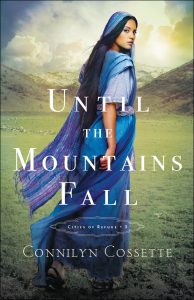The author reveals the challenges of creating three-dimensional characterizations of the men and women of the Bible.
The bestselling author of the Out From Egypt series, Connilyn Cossette debut novel, Counted With the Stars, was a finalist for the Christy Award, the INSPY Award, and the Christian Retailing’s Best Award. Her fascinating and emotional storytelling brings a biblical era to life with Until the Mountains Fall (Bethany House).
The third volume of the Cities of Refuge series, Connilyn’s prodigal daughter tale puts an Old Testament spin on a beloved parable. As the enemies that Rivkah and Malakhi face from without and within Israel grow more threatening each day, is it too late for the restoration their wounded souls seek?
In this exclusive interview, Connilyn shares some background on the novel, explains the overarching concept of the series, and outlines the challenges of balancing historical accuracy with the needs of the story…
Connilyn, what can you tell us about Until the Mountains Fall?
 This third installment in the Cities of Refuge Series is the story of Rivkah, the headstrong daughter of the head priest of Kedesh, one of the Levitical cities of refuge. When Rivkah’s young husband dies unexpectedly, she refuses to comply with the Torah law compelling her to marry his brother.
This third installment in the Cities of Refuge Series is the story of Rivkah, the headstrong daughter of the head priest of Kedesh, one of the Levitical cities of refuge. When Rivkah’s young husband dies unexpectedly, she refuses to comply with the Torah law compelling her to marry his brother.
Instead she flees the city, hoping to use her uncommon skills as a female scribe to support herself, but soon discovers that her own freedom will be the cost of such a reckless and willful decision. Malakhi is the youngest son of Moriyah and Darek, whom readers will recognize from Book One, A Light on the Hill. He has loved Rivkah for years but kept his interest in her a secret, especially after she was pledged to his older brother.
When tragedy strikes and Rivkah is left a widow, he is torn between joy that he will have the woman he’s always dreamed of and sorrow over the loss of his brother. After Rivkah disappears, he is deeply wounded by her abandonment and throws himself into the ongoing fight against the Canaanites instead of dwelling on all he has lost. When war looms on the the Eastern horizon, Rivkah’s father comes to Malakhi with an impossible request: “Bring my daughter home.”
How does this book fit into the larger picture of the Cities of Refuge series? What’s the overarching concept for the series?
The Cities of Refuge Series is a family saga that explores what might have occurred in the cities set aside in Joshua 20 as sanctuaries for those convicted of manslaughter. A Light on the Hill, the first book in the series, tells the story of Moriyah, a young woman accused of murder, and her subsequent flight from a kinsmen redeemer, or as they were commonly known in these situations, the Blood Avenger.
Until the Mountains Fall opens two decades after Moriyah entered the gates of Kedesh to plead for her life and finds her family flourishing there. Her determination to reach out to those in need of mercy and compassion, along with her commitment to following Yahweh during a time of falling away, has a profound affect on her children and on all those with whom she comes into contact.
Until the Mountains Fall gives us a picture of what it might have been like to grow up within a community built on the perfect balance of justice and mercy and what it looks like when someone rejects the safety and security of their literal and spiritual home in order to pursue their own desires.
What inspired you to set your story in this time and place?
 Out from Egypt, my first series, spanned the entirety of Exodus—from the beginning of the plagues through the fall of Jericho. When I considered what might have come next for the Hebrews after the Conquest and before the time of the Judges, I took a deeper look into the end of Joshua and became fascinated with the idea of the cities of refuge and wondered how exactly these sanctuaries might have worked.
Out from Egypt, my first series, spanned the entirety of Exodus—from the beginning of the plagues through the fall of Jericho. When I considered what might have come next for the Hebrews after the Conquest and before the time of the Judges, I took a deeper look into the end of Joshua and became fascinated with the idea of the cities of refuge and wondered how exactly these sanctuaries might have worked.
Although there is not a whole lot of information on how the cities were run, other than a few intriguing rabbinical sources and there are even questions about whether some of the designated Levitical cities were even inhabited, the laws pertaining to them are such a beautiful foreshadowing of Jesus as our High Priest and perfect sacrifice that I knew I had to explore them.
The people of Israel were not united as a true nation during this period but were more like a confederation of tribes that sometimes got along, and sometimes did not. What kept them connected was the Covenant of Abraham and worship of the One True God at Shiloh.
Although the four books in the series take place in various cities all over the Land of Israel, at its heart is Shiloh where the Tabernacle and Ark of the Covenant were situated for hundreds of years before the Temple was built in Jerusalem.
Click through to find out the research she does to get the historical details right…


